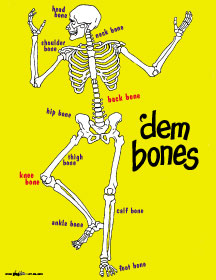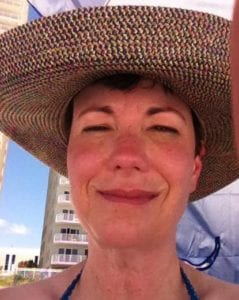Back bone connected to the shoulder bone,

Shoulder bone connected to the neck bone,

Neck bone connected to the head bone
,
And that’s the way it goes
— Dem Bones –

By Pippa Abston, MD –
You probably recognize that verse — you may have sung this more recent secular version or the original by James Weldon Johnson, ending “now hear the word of the Lord,†as a child. You might recognize the concrete truth of it, if you’ve ever stubbed your big toe and ended up with hip, back or neck pain from limping. A little more thought could put you in mind of John Donne’s “no man is an island entire of itself.â€

Pippa Abston
Just as the parts of our bodies are connected and the wellbeing of each part affects the rest, so too are humans connected. We have never devised a way to injure or ignore one group of people without that action coming back in some way on everyone else. And for some reason we never seem to stop forgetting that.
It’s that way with healthcare in Alabama too. It’s all connected.
The uninsured bone connected to the Medicaid bone, the Medicaid bone connected to the hospital bone, the hospital bone connected to the economy bone, and that’s the way it goes.
If you think you aren’t connected to these bones, because you have private insurance, you’re mistaken. And I don’t think you want to shake those bones hard enough to find out where it’s going to hurt.
This spring, like every spring since at least 2012, has been “let’s cut Medicaid and see who bleeds†season. They might as well say “let’s cut off the feet to give the rest of the body more blood.â€
Our legislators have told us that unless they hear a strong outcry from the public, the bleeding will commence. They don’t like to mention that the bleeding is already happening, or that people who have already been bled on a regular basis have a hard job mustering up strength to protest. They don’t like to mention that a hemorrhage in one part of the body has unfortunate effects on the rest.
One has said, on camera, that “we all die†in the context of premature, preventable death for children, disabled and elderly with Medicaid, and I don’t know if he realizes that even his own health could be affected. I wonder where he will go when he needs a hospital, if the hospitals in his community close because the doctors have gone away?
Last week, the Alabama House of Representatives took a large step towards rescuing our Medicaid program for 2017. The current budget puts the program $85 million short of what it needs. The House, responding to citizens, including concerned physicians, (as well as watchdog journalism), applied BP oil spill settlement funds towards debt repayment in a way that would free up $70 million dollars in the General Fund for Medicaid.
Medicaid funding patch passes Alabama House
If the Senate agrees next week and the Governor signs, we will still need to find $15 million more. We still need to find stable funding so we don’t do this again next year. We still need to expand Medicaid. And we still need real healthcare reform that leaves no one out. But as far as I can tell, that $70 million means that the most horrific proposed cut, the elimination of prescription medication coverage, will likely be off the table.
The items likely still at risk include the “optional†services of outpatient dialysis, eyeglasses, and outpatient hospice. Ending all of these combined would still leave 6.6 million uncovered, so PACE (Program for All Inclusive Care for the Elderly), which takes $6.8 million from the General Fund and which is intended to reduce costly admissions to nursing homes, could be cut to make up the total deficit.
You might be tempted to say, oh, the outpatient dialysis bone isn’t connected to me. Until you consider that your local outpatient dialysis center might not stay in business without Medicaid money, and are you quite certain you’ll never need outpatient dialysis?
It’s true that inpatient dialysis is still covered, but Medicaid only covers 3 non-emergency hospital admissions a year.
I have not seen any discussion of how the hospitals can get around this—maybe there’s a way. If not, it looks like people may have to develop symptoms from not getting dialysis on time, and risk permanent harm or death, in order to qualify for inpatient care. And even if that is worked out, the expense of inpatient services will almost certainly be higher than for outpatient care. The hospitals are termed “self-funding,†but that’s only relative to our state General Fund. The bulk of their Medicaid funding comes from your federal tax money. One way or another, you are paying for those services.
What about the glasses bone? Currently, adults with Medicaid can have new glasses every 3 years. If this is cut, they won’t get glasses at all. To get their driver’s licenses, they only have to pass the vision test once. How eager are you to be on the highway with people who can’t afford to see well?
The Hospice bone. Well, as Senator Pittman said, we will all die. If outpatient programs lose Medicaid money, will some of them have to close down? If that happens, you and your loved ones may have to die in a hospital instead of at home. I don’t know if that’s important to you or not. If not, what about your money? Outpatient hospice saves money. Yes, once again, your tax money.
I’ve been told some legislators and voters may object to BP oil spill money being used for anything other than environment. Here again, I’d say those bones are connected. The big corporations, including specifically BP, are largely responsible for climate change. They also rake in incentives, funded by your taxes, and then profit from selling gas to franchises that hire workers at minimum wage. Workers whose children qualify for state Medicaid and who lack long-term care insurance themselves. Our failure to rein in the power of these corporations — and their ability to forgo safety measures and escape responsibility for their actions — is directly related, bone by bone, to the need for Medicaid.
I’d rather not have Medicaid. I’d rather every person made a living wage. I’d rather have improved, expanded Medicare for All, or even better, a national health service for all of us. But until we change our whole system, we are ethically required to fund Medicaid fully.
If ethics don’t move you, let your self-interest be your guide. The Medicaid bone is connected to you. Damage it at your peril.
Back bone connected to the shoulder bone

Shoulder bone connected to the neck bone
Neck bone connected to the head bone

And that’s the way it goes.
The other issue this song reminds me of — we need some back bone here. We need our relatively better-off citizens to stand up to the legislature and the Governor and insist that they do the right thing. We need at least enough back bone to pick up the phone and tell them what we want.
I encourage you strongly to call your state Senator tomorrow and say “I want you to support the BP settlement plan that provides $70 million for our Medicaid program. Medicaid is vital to my health and the health of each person in our state, whether covered by Medicaid or not. I will check on your vote, and I will take it into account during the next election.â€
Pippa Abston, MD, PhD, is a pediatrician and educator practicing in Huntsville, Alabama. She can be reached by email at abstonp@gmail.com














Thank you for this very informative article! Of course these legislators are secure in the knowledge that neither they, nor anyone they care about will need medicaid to be there for them. Unless…..they happen to live out in the country where they MIGHT need emergency care one day. But then, as Chairman Pittman said, “We all have to die some time” right? I have no idea how they sleep at night……